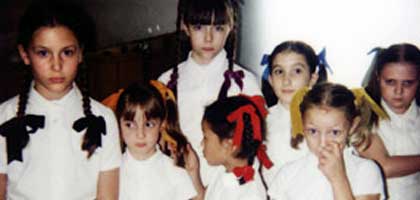
Innocence
Belgium/France/UK 2004

Reviewed by Jonathan Romney
Review
Lucile Hadzihalilovic was until recently best known as the partner and collaborator of Gaspar Noé. But, as I told a colleague recently, her much-awaited debut feature 'Innocence' - which has just won the new director's prize at San Sebastian - has little in common with Noé's work. "What's it about, then?" asked my colleague. "People having picnics in a forest?" Oddly enough, that's exactly what it's about, and nearly all its characters are little girls in pristine white frocks.
Hadzihalilovic - who co-edited Noé's 1998 'Seul contre tous' - showed in her 1996 medium-length film 'La Bouche de Jean-Pierre' (shot by Noé) that she was fascinated by the traumatised perspective of a child's-eye view: that film was about child abuse in a claustrophobic apartment block. The entirely different 'Innocence' bears some marks of the Noé connection in its ruthless establishment of a distinctive style and its play on the viewer's anxious expectations. The overall mood of uncanniness leads us from the start to expect a horror film of sorts; and that's perhaps what it is, but certainly not of the kind we anticipate.
Hadzihalilovic creates a totally self-enclosed imaginative universe, quite literally as her setting is a walled domain with no obviously accessible exit to a known outside world. Based on a story by Frank Wedekind (1864-1918), German theatre's great investigator of sexuality ('Pandora's Box', 'Spring Awakening'), the film unfolds in a girls' boarding school - a collection of houses scattered around a forest - apparently at the start of the 20th century. Each house is home to a group of girls of different ages, and the film begins with the smallest novice arriving, apparently delivered in a wooden coffin.
The new girl's housemates initiate her into a strict but benign world in which there is little adult intervention save for the supervision of two young teachers (Hélène de Fougerolles, Marion Cotillard). Daily life is a pleasant round of lessons, swimming parties and bucolic leisure. But each night the oldest girl in each house makes her way through the dark forest to the main building, the scene of rituals we can only guess at from glimpses of a maze of tunnels filled with ominous rumblings.
Hadzihalilovic's riskiest move in 'Innocence' is to use imagery that at first glance appears to belong to paedophile fantasy. But it soon becomes clear that what in one era immediately suggests sexual taboo is used in another to signify a denial of sexuality: the white frocks in this archaic world connote a fetishised ideal of purity. While investigating the nature and socially conditioned origins of female sexual knowledge, Hadzihalilovic plays with an image that advertises an absence of sexual knowledge. What makes 'Innocence' so unsettling is that everything is in the eye of the beholder - and the beholder's perspective is at once that of the too-knowing present-day adult and of the girls themselves, who perceive the world around them as an infinitely fascinating mystery.
The film draws to uncanny effect on the language of childhood dreams, alluding to fears of adulthood and death. Hadzihalilovic's vision of a republic of little girls may evoke the sexualised imagery of artists such as Hans Bellmer, Balthus and Walerian Borowczyk, but the film also - as shot by Benoît Debie, DoP on Noé's 'Irréversible' - echoes the mise en scène of French photographer Bernard Faucon, whose 1980s 'Les Grandes Vacances' series set shop mannequins of teenage boys in bizarre, ritualistic tableaux vivants. For British viewers especially, 'Innocence' will recall tales of all-female schooling, from 'Mädchen in Uniform' to 'Malory Towers', though its gothic atmosphere brings it closer to Angela Carter than Angela Brazil.
A surreal and unexpectedly euphoric climax makes it clear what 'Innocence' is really about - and the eerie richness of Hadzihalilovic's filmic language, including a chilling use of sound, means nothing can be easily reduced to straightforward allegory. With dazzling performances from a largely pre-pubescent ensemble cast, 'Innocence' is without doubt the most disconcerting French debut of the year.
